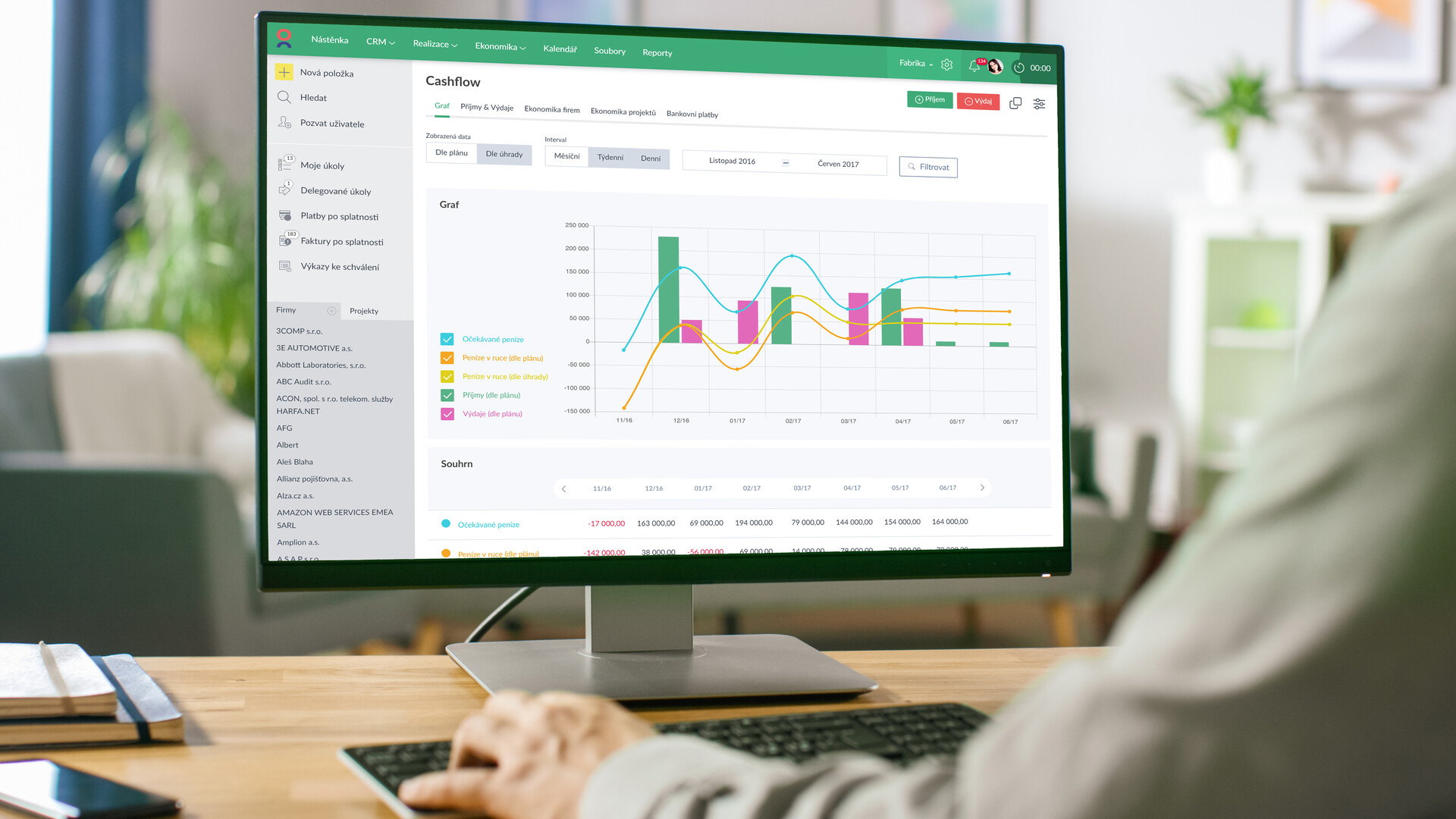Small businesses cite cash flow as one of their top challenges, and while it’s not the sole determinant, cash flow is instrumental in defining your business’s future success. Without consistent, reliable cash flow, your business can’t sustain its operations and expand.
So, growth-orientated small businesses need to improve their cash flow management before they can advance further. And, fortunately, many small-to-medium-sized businesses (SMBs) are already following the best practices for cash flow management, which we’ll explore in this article.
We’ll also take a look at general small business trends in cash flow management to see where most SMB are at.
🎓 CAFLOU® cash flow academy is brought to you by CAFLOU® - 100% digital cash flow software

How has the pandemic affected cash flow for small businesses?
Studies reveal the defining role cash flow played in the failure of SMBs – and during the pandemic, when economic setbacks were rampant, the cash flow issue for small businesses worsened.
The research highlighted the financial fragility of small businesses. Even before the pandemic set in, many businesses were surviving on a strained cash flow - the median business,with over $10,000 for monthly expenses, had just enough cash to last approximately 2 weeks.
Unsurprisingly, when the pandemic began, SMBs resorted to mass layoffs in an attempt to curtail expenditure and conserve cash flow.
How businesses are responding - what’s trending in cash flow management?
Statistics revealed that many SMBs were already struggling with cash flow management since before the pandemic – the pandemic only heightened the underlying problem.
Thus, for some small businesses, the pandemic served as a wake-up call to reassess how they manage cash flow – leading to a greater focus on digitalisation, budgeting, and the implementation of the best cash flow management practices.
Here’s more on how SMBs are evolving their cash flow management.
1. Digital transformation of financial processes
The shift towards the digitalisation of financial processes is on the rise, with practices such as digital payments gaining traction. Strategic digitalisation initiatives help small businesses better manage cash flow with transparent systems, forecasting, and automation.
Businesses can use finance digitalisation to facilitate:
1. The easier collection and analysis of data. Applications such as digital financial dashboards provide businesses with a centralized view of their finances across business operations (marketing, IT, customer services, etc.).
This faster and more efficient data processing allows companies to more accurately anticipate future trends and possible disruptions in their cash flow. Consequently, small businesses can more readily adapt and pivot to circumvent cash flow problems.
2. Improved billing. Late payments are the number one reason behind disruptions in cash flow. However, leveraging technology can help mitigate this issue and streamline your collection process.
For example, invoicing systems allow businesses to check the statuses of invoices in real time while automated billing disqualifies the need for time-intensive, manual billing. Small businesses can also leverage business management tools to send automated invoices to reduce the likelihood of delays.
3. The automation of core accounting processes. By digitising routine tasks such as invoicing, reminders, collection management, etc. businesses can not only save on time and money, but also reduce errors. One study found that 58.7% of businesses that adopted AP (accounts payables) technology experienced fewer errors in their invoicing.
2. Consulting the experts
For small and large businesses alike, hiring a financial consultant can help you manage finances, cash flow and sustain long-term profitability. Businesses are becoming more comfortable with opting for external help, allowing them to:
1. Access better talent. Business owners can get advice from expert consultants instead of less-experienced in-house accountants.
2. Avoid the expensive costs of hiring in-house teams, and the payroll tax that comes with it. The global pandemic made it clear that businesses cannot afford to overstretch their workforce and need to be mindful of their revenue per employee.
Cash flow management has evolved substantially in recent years, largely due to the digitalisation we discussed earlier. For these reasons, businesses may not be able to rely solely on in-house accountants.
New proceedings, greater digitilisation and automation (that demand specialized skills), as well as rising expectations from customers are all making it essential for accountants to expand their skillset. For this reason, small businesses can benefit more by consulting financial controllers and cash flow managers with deeper expertise and advanced skill sets.
3. Prioritising risk mitigation
Many SMBs, including profitable ones, operate on thin margins. One survey found that 31% of SMBs had only enough cash reserves for 1-2 months, whereas 58% had only 3-5 months of working capital. These businesses are more susceptible to risk and lack financial flexibility.
So, it’s important for small businesses to consider risk management practices. You can help mitigate risk associated with cash flow by:
1. Identifying the quantum gap – i.e., the shortfalls in your cash flow. For example, are some projects barely profitable and consuming too many resources? Financial consultants can help you out here – identifying these gaps is the first step toward solving cash flow bottlenecks and sustaining business growth.
2. Simplifying the way your business produces foresight. As discussed above, a lot of routine tasks today can be automated. This accelerates the rate at which tasks are performed and data is processed.
Forecasting apps readily provide feedback, helping business owners make informed decisions. Additionally, small businesses can further improve productivity by using an integrated, multi-functional apps instead of numerous, single-purpose apps. Using a single, integrated software also helps businesses centralize economics.
3. Leverage technology. 70% of small businesses still resort to traditional spreadsheets to process their numbers. Not only is this practice time-consuming, but it's more prone to errors.
Fortunately, business management systems like Caflou and other cash flow management software let you move beyond spreadsheets for cash flow management.
For example, Caflou centralizes your financial flow, allowing you to determine which projects, customers, and operations generate revenue – and where cash leaves your organization. These software solutions also let small business owners identify opportunities to cut costs.
4. Reducing friction. As mentioned above, late payments are a primary contributor to small business cash flow challenges. Businesses can reduce delayed payments by removing friction and improving efficiency, such as by offering more payment options and automating invoices.

4. Managing business economics at every level
You can achieve more sustainable cash flow by managing business economics at every level. At a micro level, this means increasing the profitability of projects and implementing practices that ensure a higher revenue per employee.
Some practices that small businesses are leveraging include:
1. Using automation to increase employee value. Automation not only possesses the potential to directly improve cash flow (by cutting costs and improving efficiency), but also raise the value of your workforce. By automating repetitive or routine tasks, employees are free to focus on strategy, specialized tasks, and driving business goals.
Workflow automation software (like Caflou) further improves productivity by assigning jobs, tracking task progress, and holding employees accountable. By streamlining your workflow, small business owners can eliminate redundant costs and improve projects’ profitability.
2. Freelancing and outsourcing. Small businesses can sometimes experience a hiring freeze when their limited revenue does not allow them to hire in-house talent. One way to overcome this impasse is to outsource work and hire freelancers. This not only gives small businesses access to specialised talent but also benefits cash flow by allowing small businesses to save on overhead costs and onboarding.
A greater focus on documentation and budgeting
According to some recent findings, small businesses usually avoid budgeting for two reasons:
1. They believe budgeting is unnecessary, or that they will be unsuccessful at anticipating earnings.
2. They view budgeting as restrictive.
However, research has revealed that budgeting plays a key role in driving business growth. But, according to the study above by Clutch, 50% of small businesses did not have an official, documented budget in 2020. By 2021, this percentage had risen only slightly - by 4% - leaving 46% of small businesses still without documented budgets.
Small businesses that don’t have a documented budget are missing out on:
1. Aligning company objectives. A set budget provides a framework for your business to build a plan of action and align operational tasks with long-term goals.
2. Managing debt better. Assigning budgets introduces a sense of accountability around financial spend, and helps teams precisely track financial activities and expenditures.
3. Evaluating performance. Defining a budget helps calculate the profit your business makes during each quarter. Budgeting, therefore, becomes a means of measuring business success.
4. Tracking cash flow. Budgeting provides a roadmap for your business’s expenses and investments and helps you enhance resource allocation – you can eliminate wasteful spend and justify expenditures that yield ROI.
When planning your budget for the upcoming quarter, you can make your estimations more accurate by considering:
1. The sources of revenue.
2. Expenses – and where they’re concentrated (e.g. on specific projects).
3. Your currently available capital.
4. Historical financial data (e.g., your previous quarters’ expenditure).
Small business owners can’t make these estimations without documentation. So, documenting your financial process is crucial.
The road ahead - refining your business’s cash flow management
Recent trends indicate that more small business owners are rethinking their cash flow management and moving towards formal financial management processes. Small businesses looking to optimize their cash flow management will:
- Take a systematic approach to cash flow management. Small businesses will need to overcome their fears of budget allocation and embrace documenting their finances, recording expenditure, and analyzing quarterly data to optimize cash flow.
- Rely on expert help. Small businesses struggling with cash flow management will look beyond in-house accountants towards financial consultants and cash flow experts. These experts help identify bottlenecks, cut wasteful expenditure, and ultimately optimize your cash flow.
- Embrace technology and automation. Spreadsheets and documents aren’t enough to holistically manage your business economics; small business owners must embrace cash flow management solutions to monitor and optimize their economics.
And if you’re ready to optimize your business and cash flow management, Caflou is a great option. It’s a fully integrated business management and cash flow management solution. With Caflou, teams can track time, managers monitor a project’s progress and profitability, owners manage and optimize business economics, automate mundane tasks, and more.
It’s the only solution small businesses need to manage their projects, team members, and cash flow. So when you’re ready, get started with Caflou for free.